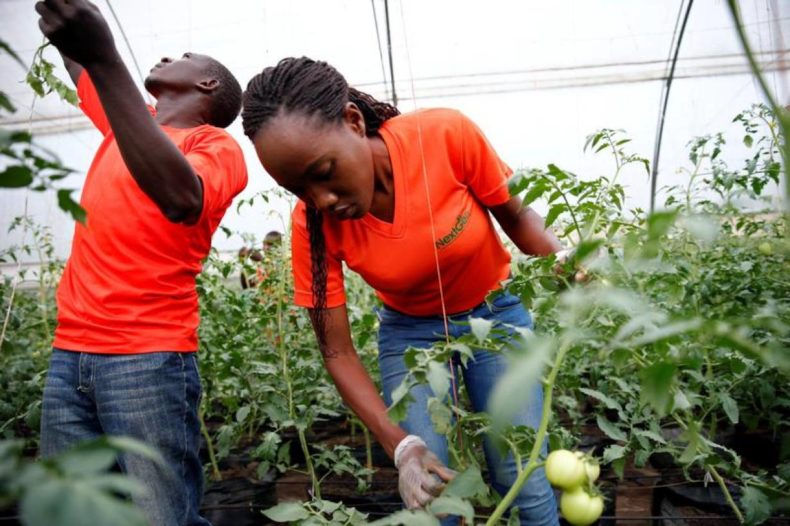As the Africa Food Systems Forum 2024 ends, we Africans need to reflect to make a choice not to or to face the real challenge to our food systems and climate change. The Africa Food Systems Forum 2024 kicked off on September 2nd in Kigali, Rwanda, under the theme “Innovate, Accelerate, and Scale.” The forum aims to address the critical need to increase yields for smallholder farmers across the continent.
The current population of Africa is 1,521,349,516, based on the latest United Nations estimates. It is also important to note that women make up over 50 percent of this population. According to recent African Union reports, Africa has the youngest population in the world with more than 400 million young people aged between the ages of 15 to 35 years. This indicates that actually, the future of Africa is youth. There is no option but to deliberately involve youth and women in agriculture as a pathway to a sustainable African food system. African leaders, governments, the private sector, and the development partners must come to terms, realign, and appreciate the demographic shifts to achieve sustainable development as well as business. I hereby share thoughts on what we need to focus on to ensure we Innovate, Accelerate, and Scale our Food Systems.
- Realign policies to respond to the needs and changing trends to encourage women and youth in programs, projects, and businesses that address food systems. These policies must be in a position to talk to each other as well as complete each other. For example, the policies on agriculture or climate action must speak or sync with policies that emanate from trade and commerce. Agriculture cannot be successful minus the enterprise and commerce aspect. The policies should also spell out simple and minimize bottlenecks in promoting the involvement of youth and women in the food systems space. For example, policies on land, land access, land management, taxation, and agriculture need also to align, and talk to each other in a progressive approach to development.
- Implement the Malabo Declaration by committing to allocating at least 10% of national budgetary resources to agriculture. African governments must be encouraged and reminded to invest resources in where their potential lie. Africa is by default an Agricultural economy, therefore all the governments need to realign and budget properly to address food systems challenges. It is unfortunate that so far no country in Africa has honored this declaration.
- Embrace technology, digitization, artificial intelligence, and the Internet of Things in food systems interventions. The COVID-19 pandemic brought us to a new normal, Africa should not fall back or off the future of things as the youth are largely influencing and adapting to technology as it continues to evolve. It is high time, investments and private sector support embrace digitization and the Internet of things to shape up the Africa Food Systems. With cases of inadequate arable land or human-wildlife conflicts, such technologies can be embraced to create vertical and artificial spaces as well as cheap marketing plus distribution mechanisms. This is the space for young people, and thus creating an enabling environment as well as skills in these areas will go a long way in ensuring Africa remains food secure.
- Assure accessible and affordable financing for agriculture and climate action ventures. Given the dynamics in owning assets or collateral to access capital for commercial agriculture or engaging in agribusiness by women and youth, incentives must be set to attract and encourage this group to the food systems. Private sector and development partners need to be deliberate in supporting and promoting enterprises to grow and operate by availing affordable credit or financing. Most women and youth end up being auctioned or even commit suicide based on frustrations related to their business cash flows or financing as business can be challenging at times. Agriculture ventures or agribusinesses must not be treated as normal trade ventures; some are seasonal while others take longer to return. It is not easy to convince financial institutions to risks in youth and women agri-ventures. This causes fear and averseness of women and youth in agriculture-oriented businesses. Added to financing, we must also think critically about Insurance options for agriculture.
- Mentorship towards Agribusiness and Green Businesses. We must collectively put effort into mentorship, training, and incubation of women and youth ventures to make them enterprises or businesses. These ventures should be angled towards climate action by promoting renewable energy uptake for commercial agriculture across Africa. Uptake of renewable energy not only helps us in conserving the environment or reduction of carbon emissions, saving on business running costs but it also helps us in creating and introducing new pathways of employment and wealth creation for our youth. Investment and training should continuously be considered in the building and development of new business ventures towards a food-secure Africa.
Finally, it is time for fewer talks and more action, let us experience action and evaluation of actions based on the declarations from the Africa Food Systems Summit 2024 in Kigali –Rwanda. #AFSForum24
Kelvin Keya
Executive Director- Change for Planet Foundation







